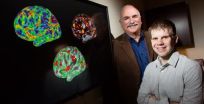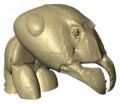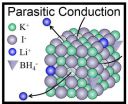A full serving of protein at each meal needed for maximum muscle health
2014-05-20
(Press-News.org) Most Americans eat a diet that consists of little to no protein for breakfast, a bit of protein at lunch and an overabundance of protein at dinner. As long as they get their recommended dietary allowance of about 60 grams, it's all good, right?
Not according to new research from a team of scientists led by muscle metabolism expert Doug Paddon-Jones of the University of Texas Medical Branch at Galveston. This research shows that the typical cereal or carbohydrate-dominated breakfast, a sandwich or salad at lunch and overly large serving of meat/protein for dinner may not provide the best metabolic environment to promote healthy aging and maintenance of muscle size and strength.
The new study, now online in press in the Journal of Nutrition, shows that the potential for muscle growth is less than optimal when protein consumption is skewed toward the evening meal instead of being evenly distributed throughout the day.
Age-related conditions such as osteoporosis (bone weakening) and sarcopenia (muscle wasting) do not develop all of a sudden. Rather they are insidious processes precipitated by suboptimal lifestyle practices, such as diet and exercise, in early middle age, the study states.
The study's results were obtained by measuring muscle protein synthesis rates in healthy adults who consumed two similar diets that differed in protein distribution throughout the day. One of the diets contained 30 grams of protein at each meal, while the other contained 10 grams at breakfast, 15 grams at lunch and 65 grams at dinner. Lean beef was the primary nutrient-dense source of protein for each daily menu. Using blood samples and thigh muscle biopsies, the researchers then determined the subjects' muscle protein synthesis rates over a 24-hour period.
The UTMB researchers provided volunteers with a generous daily dose of 90 grams of protein — consistent with the average amount currently consumed by healthy adults in the United States. While very active individuals may benefit from a slightly higher protein intake, the team's previous research suggests that, for the majority of adults, additional protein will likely have a diminishing positive effect on muscle metabolism, while any less may fail to provide optimal muscle metabolism support.
When study volunteers consumed the evenly distributed protein meals, their 24-hour muscle protein synthesis was 25 percent greater than subjects who ate according to the skewed protein distribution pattern. This result was not altered by several days of habituation to either protein distribution pattern.
The results of the study, Paddon-Jones points out, seem to show that a more effective pattern of protein consumption is likely to differ dramatically from many Americans' daily eating habits.
"Usually, we eat very little protein at breakfast, a bit more at lunch and then consume a large amount at night. When was the last time you had just 4 ounces of anything during dinner at a restaurant?" Paddon-Jones said. "So we're not taking enough protein on board for efficient muscle building and repair during the day, and at night we're often taking in more than we can use. We run the risk of having this excess oxidized and ending up as glucose or fat."
A more efficient eating strategy for making muscle and controlling total caloric intake would be to shift some of the extra protein consumed at dinner to lunch and breakfast.
"You don't have to eat massive amounts of protein to maximize muscle synthesis, you just have to be a little more thoughtful with how you apportion it," Paddon-Jones said. "For breakfast consider replacing some carbohydrate, particularly the simple sugars, with high-quality protein. Throw in an egg, a glass of milk, yogurt or add a handful of nuts to get closer to 30 grams of protein, do something similar to get to 30 for lunch, and then moderate the amount of protein for dinner. Do this, and over the course of the day you will likely spend much more time synthesizing muscle protein."
INFORMATION:
Other authors of the paper ("Dietary Protein Distribution Positively Influences 24-h Muscle Protein Synthesis in Healthy Adults") include Madonna M. Mamerow, Jonie A Mettler, Kirk L. English, Shanon L. Casperson, Emily Arentson-Lantz, Melinda Sheffield-Moore and Donald K. Layman. The study was supported by funding from the Beef Checkoff, the UTMB Institute for Translational Sciences, the National Institutes of Health National Center for Research Resources and the Claude D. Pepper Older Americans Independence Center NIH/National Institute on Aging.
ELSE PRESS RELEASES FROM THIS DATE:
Cognitive test can differentiate between Alzheimer's and normal aging
2014-05-20
CHAMPAIGN, Ill. — Researchers have developed a new cognitive test that can better determine whether memory impairments are due to very mild Alzheimer's disease or the normal aging process.
Their study appears in the journal Neuropsychologia.
The Alzheimer's Association estimates that the number of Americans living with Alzheimer's disease will increase from 5 million in 2014 to as many as 16 million by 2050. Memory impairments and other early symptoms of Alzheimer's are often difficult to differentiate from the effects of normal aging, making it hard for doctors to ...
School-based interventions could benefit children from military families
2014-05-20
COLUMBIA, Mo. – Nearly 2 million children in the United States have experienced a parent's military deployment. Previous research has shown that these children may be at increased risk for emotional, behavioral and relationship difficulties, yet little is known about how best to address military children's specialized needs. Now, an MU researcher says school-based interventions could benefit children whose parents have deployed.
David Albright, an assistant professor at the MU School of Social Work, says military children are an overlooked population in need ...
Unlocking the potential of bacterial gene clusters to discover new antibiotics
2014-05-20
Resistance to antibiotics has been steadily rising, posing a threat to public health. Now, a method from Mohammad Seyedsayamdost, an assistant professor of chemistry at Princeton University, may open the door to the discovery of a host of potential drug candidates.
The vast majority of anti-infectives on the market today are bacterial natural products, made by biosynthetic gene clusters. Genome sequencing of bacteria has revealed that these active gene clusters are outnumbered approximately ten times by so-called silent gene clusters.
"Turning these clusters on would ...
Receptive to music
2014-05-20
This news release is available in German. Music can be soothing or stirring, it can make us dance or make us sad. Blood pressure, heartbeat, respiration and even body temperature – music affects the body in a variety of ways. It triggers especially powerful physical reactions in pregnant women. Scientists at the Max Planck Institute for Human Cognitive and Brain Sciences in Leipzig have discovered that pregnant women compared to their non-pregnant counterparts rate music as more intensely pleasant and unpleasant, associated with greater changes in blood pressure. Music ...
Update for Skunk Fire, Arizona
2014-05-20
The Skunk Fire which began as a lightning strike on Saturday, April 19 is currently 31,167 acres large including fire growth and back burns.The fire continues to move in a north westerly direction and an easterly direction towards ponderosa pine forest. South and North side of the fire is contained. The terrain for this fire is steep with scattered boulders making firefighting more difficult. The entire fire is currently 44% contained and full containment is expected by Friday, May 23, according to Inciweb.org.
The National Weather Service has forecast maximum temperatures ...
Boosting Immune process with IFN-γ helps clear lethal bacteria in cystic fibrosis
2014-05-20
Boosting a key immune process called autophagy with interferon gamma (IFN-γ) could help clear a lethal bacterial infection in cystic fibrosis, a new study suggests. The work, led by a team in The Research Institute at Nationwide Children's Hospital and published in PLoS One in May, offers new information about immune function in patients with the disease.
Cystic fibrosis, CF for short, is caused by a malfunction in the CFTR gene, which is responsible for transporting chloride and water across cell membranes. In people with the disease, cells that line the passageways ...
Scientists study biomechanics behind amazing ant strength
2014-05-20
A recent study into the biomechanics of the necks of ants – a common insect that can amazingly lift objects many times heavier than its own body – might unlock one of nature's little mysteries and, quite possibly, open the door to advancements in robotic engineering.
A small group of engineers at The Ohio State University combined laboratory testing and computational modeling conducted at the Ohio Supercomputer Center to determine the relationship between the mechanical function, structural design and material properties of the Allegheny mound ant (Formica exsectoides). ...
New lithium battery created in Japan
2014-05-20
WASHINGTON D.C., May 20, 2014 -- The long life of lithium ion batteries makes them the rechargeable of choice for everything from implantable medical devices to wearable consumer electronics. But lithium ion batteries rely on liquid chemistries involving lithium salts dissolved in organic solvents, creating flame risks that would be avoided if the cells were completely solid-state.
Now a team of researchers at Tohoku University in Japan has created a new type of lithium ion conductor for future batteries that could be the basis for a whole new generation of solid-state ...
Reading privacy policy lowers trust
2014-05-20
Website privacy policies are almost obligatory for many online services, but for anyone who reads these often unwieldy documents, trust in the provider is more commonly reduced than gained, according to US researchers.
Almost every commercial website, social network, search engine and banking site has a privacy policy. Indeed, these and countless other sites that scrape personal information via forms, logins and tracking cookies are obliged by law in some parts of the world to post a document online giving details of how they protect any personal data you give the site ...
Can mobile phones cause allergic reactions?
2014-05-20
New Rochelle, NY, May 20, 2014—Studies have identified mobile phones and related devices as sources of metal sensitization and potential causes of allergic contact dermatitis (ACD). Despite efforts to control allergen release in phones, many phones on the market release levels of metals, such as nickel and chromium, which are sufficient to induce ACD, according to an article in Pediatric Allergy, Immunology, and Pulmonology, a peer-reviewed journal published by Mary Ann Liebert, Inc., publishers. The article is available free on the Pediatric Allergy, Immunology, and Pulmonology ...






